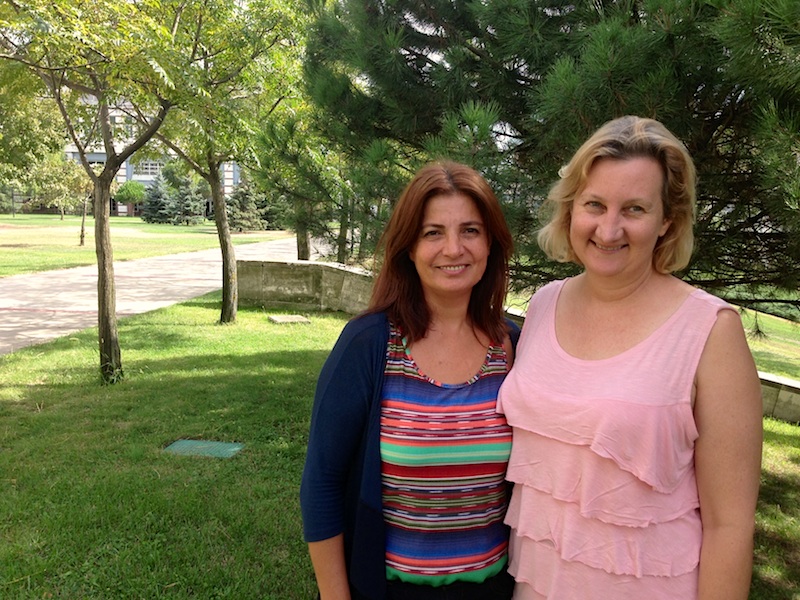
Yaşar University Conference, Izmir 3-4 May 2013
by
Nezaket Özgirin & Sharon Çeltek
This was a joint conference between Yaşar University SoFL (School of Foreign Languages) and the IATEFL LAMSIG (Leadership and Management SIG). The theme was quality and standards in language teaching with a focus on accreditation. Presenters and participants tried to define and critically analyse what quality means in a language program context and reflect on objective tools to evaluate it
Yaşar University SoFL has just been accredited by the Commission on English Language Program Accreditation (CEA) which accredits postsecondary English language programs in colleges, independent language schools and universities in the US and internationally. The work of the CEA was outlined in a plenary by the Executive Director of the CEA as well as in concurrent sessions given by those who had undergone the process.
Some other highlights of the conference were:
Zen and the Art of educational leadership by Aylin Graves
Taking the book ‘Zen and the Art of Motorcycle Maintenance’ (ZAMM) by Robert Pirsig as her inspiration, Aylin Graves used scenarios to illustrate how educational leaders can incorporate principles of Zen Buddhism into their management styles. Key points from this session were the concepts of static and dynamic quality, being mindful, keeping a beginner’s not-knowing mind and empathy. There were also some great quotes form ZAMM, including this one which underlay the whole session: ‘the real cycle you’re working on is a cycle called yourself’.
Making a Difference in Educational Quality through Classroom observations by Handan Bilir
This session presented the research results of a qualitative study conducted at Istanbul Şehir University on teachers’ perceptions of the benefits of observations. The majority of teachers in this study believed that classroom observations contributed to the effectiveness of their teaching. This was a particularly rewarding session since the presenter, Handan Bilir, is one of our SLTEP graduates and was putting into practice core components of what she had covered on that course.
Roads to Quality Street Revisited by George Pickering
This was an interactive and entertaining plenary on the options available for creating and sustaining a quality organisation. Among several important factors, Pickering looked at purpose driven leadership (‘In matters of style, swim with the current, in matters of principle, stand like a rock’- Thomas Jefferson); modelling and benchmarking (‘Good artists copy, great artists steal’- Picasso) and the role of self-assessment/ self-evaluation (‘If I don’t practise one day, I know it; two days, the critics know it; three days, the public knows it’- Jasch Heifetz).
A Quest for Excellence in Teaching-A Non-Native English Speaker’s Perspective by Yilin Sun
Yilin Sun, who serves as President-elect of TESOL International, has 22 years of teaching experience in the field of ELT, has a MA-TESL and is a teacher trainer, a researcher, a teacher, a teacher supervisor and program leader in China, Canada and the USA. As the first president of TESOL with a Chinese background, she mainly talked about her experience in Canada as an NNES (Non-native English Speaker) ELT professional doing her MA programme and her progress to her current position.
She emphasized the roles of NNESs and encouraged everyone to contribute more to the field by sending research papers to professional journals and presenting more at national and international conferences. Some of her suggestions to NNESs were to engage in research and publications, to make sure their voices are heard saying that NNESTs outnumbers NSs. Some of the challenges that ELT teachers face today have been listed as:
What norm- which English to teach?
What is my responsibility as a NNEST?
How to teach the new generation of students?
How to integrate technology in ELT?
How to get support to access PD?
When to find time to do all these?
She also summarized major trends CBLI(Content-Based Language Instructions), CLIL (Content and Language Integrated Learning), SIOP (Sheltered Instruction Observation Protocol & SADIE (Specially Designed Academic Instruction), WE (World Englishes) but no longer ‘foreign’. Two of the most influential comments of hers were to educate learners to become critical social agents for constructive change and to be proud of our English(es). She concluded her session saying:
“Let’s work together to strive for excellence in quality and standards in English Teaching and Learning in the global context and build a stronger Global ELT Community!”
 Reflective Practice 2.0 by Burcu Akyol
Reflective Practice 2.0 by Burcu Akyol
http://www.flickr.com/photos/courosa/2922421696/
In the world of the networked teacher, Akyol shared the web2 tools she used for personal reflection. Apart from blogs some of the following tools can be used for various reflection tasks.
Penzu and my future self as an online diary http://penzu.com/
For easy video recording your lessons: Pixorial: http://www.pixorial.com/
For professional reflection scoop-it: http://www.ukcle.ac.uk/resources/personal-development-planning/what/ (you can check the link for more ideas)
